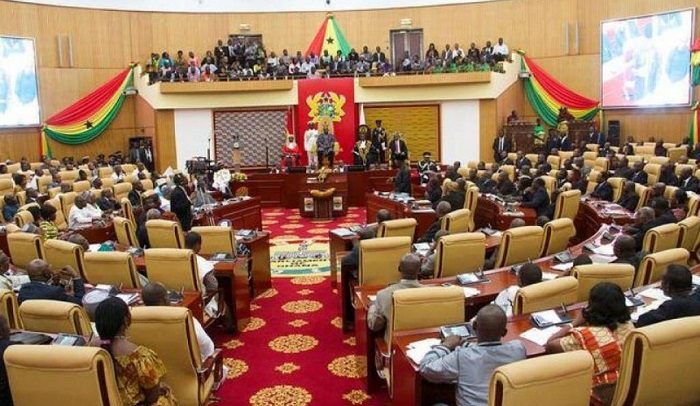A brawl broke out in Parliament on Monday midnight as members of the House from the ruling New Patriotic Party (NPP) and opposition National Democratic Congress (NDC) threw punches at one another.
The chaotic scene erupted during a vote to determine whether the controversial Electronic Transfer Levy Bill popularly known as the E-levy should be taken under a certificate of urgency.
The fight started when members of the Minority Caucus (NDC) attempted to take away the chair of the Speaker to prevent the Second Deputy Speaker, Andrew Amoako Asiamah, the Independent MP from Fomena, from occupying it after the First Deputy Speaker, Joseph Osei-Wusu had withdrawn from the chair.
The First Deputy Speaker had served notice he was withdrawing from the Speaker’s chair to enable him to take his vote as MP for Bekwai, which decision did not sit well with the NDC MPs.
The NDC lawmakers, led by A.B.A Fuseini (Sagnarigu Constituency) and Edwin Nii Lante Vanderpuye (Odododiodio Constituency), walked over to the podium and attempted to grab the Speaker’s chair but they were prevented by the members of the Majority Caucus.
In the process, a scuffle ensued between the rival lawmakers, degenerating into full-blown fisticuffs.
The parliamentary security officers were seen pouring onto the floor of the House to quell the disturbance, with a bewildered look on the faces of people at the public gallery.
The situation compelled the House to be abruptly adjourned.
The political tensions have run high in the House since the December 7, 2020 elections produced a hung parliament, without a dominant party to push through the business of government, including budget approvals.
*Similar Incidents*
On December 1, 2021, the opposition NDC MPs displayed similar unruly behaviour in Parliament when they attempted to manhandle the First Deputy Speaker, Joseph Osei-Wusu, who presided in the absence of the Speaker, Alban Bagbin.
Mr. Osei-Wusu’s crime was that he had dismissed the request by the NDC Minority Caucus to have a rescission of the passage of Budget Statement and Economic Policy of the government for the year ending 31st December 2022.
Following the First Deputy Speaker’s decision, there was a total breakdown of law and order as members of the Minority NDC protested.
Dozens of the NDC MPs were seen pushing and shoving the parliamentary security officers in an attempt to get hold of the First Deputy Speaker.
The nasty scener opposition lawmakers enacted in the House on that day was similar to what happened on the night of January 7, during the election of the Speaker.
Footages showed Ernest Henry Norgbey (Ashaiman), Sam Nettey George (Ningo-Prampram), Murtala Muhammed Ibrahim (Tamale Central), Yusif Issaka Jajah (Ayawaso North), Emmanuel Abambire Bawa (Bongo), and Bashir A. Fusieni Alhassan (Sagnarigu) leading the onslaught on the First Deputy Speaker.
They later succeeded in throwing on the floor the Speaker’s Chair after Mr. Osei-Wusu had been ushered out of the chamber.
In Monday night’s incident, the opposition MPs could not succeed in their plan to take away the Speaker’s chair and therefore decided to vent their anger on their opponents.
*Missing Speaker*
While the ugly scenes were unfolding on the floor of Parliament, the whereabouts of the Speaker of Parliament, Alban Bagbin remained unknown, with the members of the Majority Caucus accusing him of unceremoniously leaving Parliament ahead of a crucial decision to give the Minority advantage.
Deputy Majority Leader, Alexander Afenyo-Markin said “the NDC’s determination to obstruct and frustrate the government business has today been supported by the Speaker of Parliament who is the law sovereign and president of the House.”
“And considering the critical numbers – thus 138 for Majority and 137 for Minority, this is the time we expect Mr. Speaker to live up to his bona-fiding to the people of Ghana, which is to show leadership,” he told the media before the headcount of MPs for the voting.
According to him, the unavoidable absence of the Speaker from the chamber was viewed by the Majority group “as a grand political partisan design” to frustrate government business, intimating that they did not want to believe the Speaker was giving tacit endorsement to this move.
“I regret to say that we cannot proceed to decide without Mr. Speaker. We need Mr. Speaker in the House. We need the Speaker of Parliament in the House because by the technicalities of our procedures, if Mr. Speaker is not there, one of our own would have to sit in.
“And the imperatives of the Constitution are clear that he will therefore not have an opportunity to have his right of voting as a member.”
“We are not in to look at the lacuna in the law which could also mean that when there is a tie, to the extent that the Constitution is silent to his casting vote, he could exercise his casting vote right.”
“In parliament leadership is consulted and engaged.
We have no information as to the whereabouts of Mr. Speaker. The leadership of the Majority has not been informed of the reasons Mr. Speaker is unavoidably absent this evening from the chamber of Parliament,” Mr. Afenyo-Markin posited.
By Ernest Kofi Adu, Parliament House


